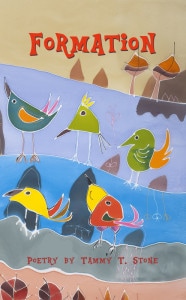Formation contains Far Eastern impressions and beautiful haikus
– Book Review by Carole Mertz –
Prolific Pres, 2015, ISBN – 13:9781632750150, 129 pages, $14.95 (also available in Kindle version)
It was a delight to discover Tammy T. Stone’s Formation. In this collection of poetry written left aligned and in fairly loose form, Stone creates her verses by looking closely at her surroundings and sharing them with an unrestrained and open generosity that I find especially appealing. Through her lines we find ourselves visiting a park in Toronto, Florida’s Disney World, or, more likely, a beautiful forest, temple, or village in the Far East.
Her Far Eastern impressions fill a greater part of this collection, however her final segment is comprised entirely of beautiful haiku. It’s easy for readers to place themselves in her settings, for they are told vividly. In one haiku (p. 108):
twilight takes me
secret worlds laced-in
fairies and roses
Here we feel transported into her magical world. From these few words, recollections of reading Burnett’s The Secret Garden returned to me, leaping from the page and bringing back some special childhood joys.
Stone is an author, photographer, and physical health practitioner. She divides her life between her residence in Japan and giving yoga instruction in various locations in Canada. Because meditation is an important part of her personal life, she offers poems “from the inside out,” as it were. Her artistic perceptions often bring surprises into her lines. One such poem appears on page 56. (Note: all of her poems are untitled, but fall into these titled sections: “It Came from Here,” “It Starts with Dreams,” “From Here, I See,” “Kali Dance: Five Rupee Poems,” and “I Used to Dream of Here;” and the final section of 25 haiku, “In the Bamboo Talking” closes the collection.)
There you are
sitting, quiet,
eyes closed,
next to the others
we’re all under
the blanket
of my mind.
Many writers have shared recollections of Jack Kerouac’s work. In her October 22, 2014 blogpost, I found Stone also focused on Kerouac, admitting that he inspired her early yearnings as a budding author. “[He is] still my co-conspirator in nostalgia, myth-making and spiritual searching as I reread some of his books as an adult.”
In Formation she gives Kerouac special place in her poem found on p. 57: “Jack Kerouac on/ Desolation Peak, looking / down, watching, / eating out of tin cans, / doing things feverishly, writing, / thinking about God.” Stone writes in her blog that Kerouac and the Beats (Burroughs, Ferlinghetti, Allen Ginsberg, and others) represent to her “one long homage to a lovely, bizarre, entirely mesmerizing Truth.”
I also detect this Beats’ influence from many lines in Formation, such as the following: “You are a mountain / and your thoughts are clouds passing by…” (p. 57). Or in, “Say it again / serpent sky, / listen to the water / rushing where there is no water…” (p. 59). Or in, “My mind throws pieces at me…/ Every thought I / don’t keep / is one piece of / darkness / in the world removed.” (p.62). Stone seeks after Truth, her Truth, and blends her discoveries into meditational-type writing. These “meditations” may be helpful to some, or pure poetical enjoyment for others.
On p. 83, Stone offers a quote from an Eastern Monk. “Choosing one religion over another creates separation,” he says. The sage relates that concentrating on books is easy, but “to focus on meditation is more difficult. Don’t do it for selfish purposes. Practice karma…and the concentration will come.” We see Stone working this karma in many of her poems.

In the haiku at the end of this volume, for example, are numerous portrayals of Eastern spiritual concepts. One such appears on page 127:
make the trip
with the windhorse
gods fluttering close
(My research revealed “Raising windhorse” refers to a Tibetan meditational concept of experiencing clarity through mindfulness of the present moment.)
In Formation, Tammy T. Stone’s world seems to draw us inward, inviting us to think of formation as an action taking place this very moment. We ride the windhorse, becoming aware of the currents that flow through her moving stanzas.
If her meditational habits and haiku define efforts to arrive at inner peace, we cannot always feel reassured for Stone. See her lines on p. 107:
dark night falls
everything thought wrong,
still, I need you
I daresay, in all meditation, it is not only the end result that matters, but the fact of choosing the meditational path. Stone writes: “There are things we shouldn’t see / if we want to aim for happiness.” What is important to her is not a turning away from, “but a moving to what is, / instead, an embracing.” (p. 27). I can hope her meditations yield her assuring revelations, even as I enjoy the Beats-flavored poetry she creates.

About the Author – Carole Mertz
Carole Mertz critiques poetry and prose for various literary journals, including most recently at Eclectica, Mom Egg Review, and South 85 Journal. Her recent poetry is at Muddy River Poetry Review, Front Porch Review, The Ekphrastic Review, and elsewhere. She assessed poetry submissions to Women’s National Book Association’s 2018 Poetry Contest and is advance reader in poetry and prose for Mom Egg Review. Carole resides with her husband in Parma, Ohio, where she teaches music to young children.
Did you like this Book Review by Carole Mertz? Then you might also like:
Sam sax’s Madness Under Examination
Take a Does of Michael Pollan’s Latest Batch, How to Change Your Mind
Through, Not Around: Stories of Infertility and Pregnancy Loss
To check out all the book reviews available on Dreamers, visit our book review section!
